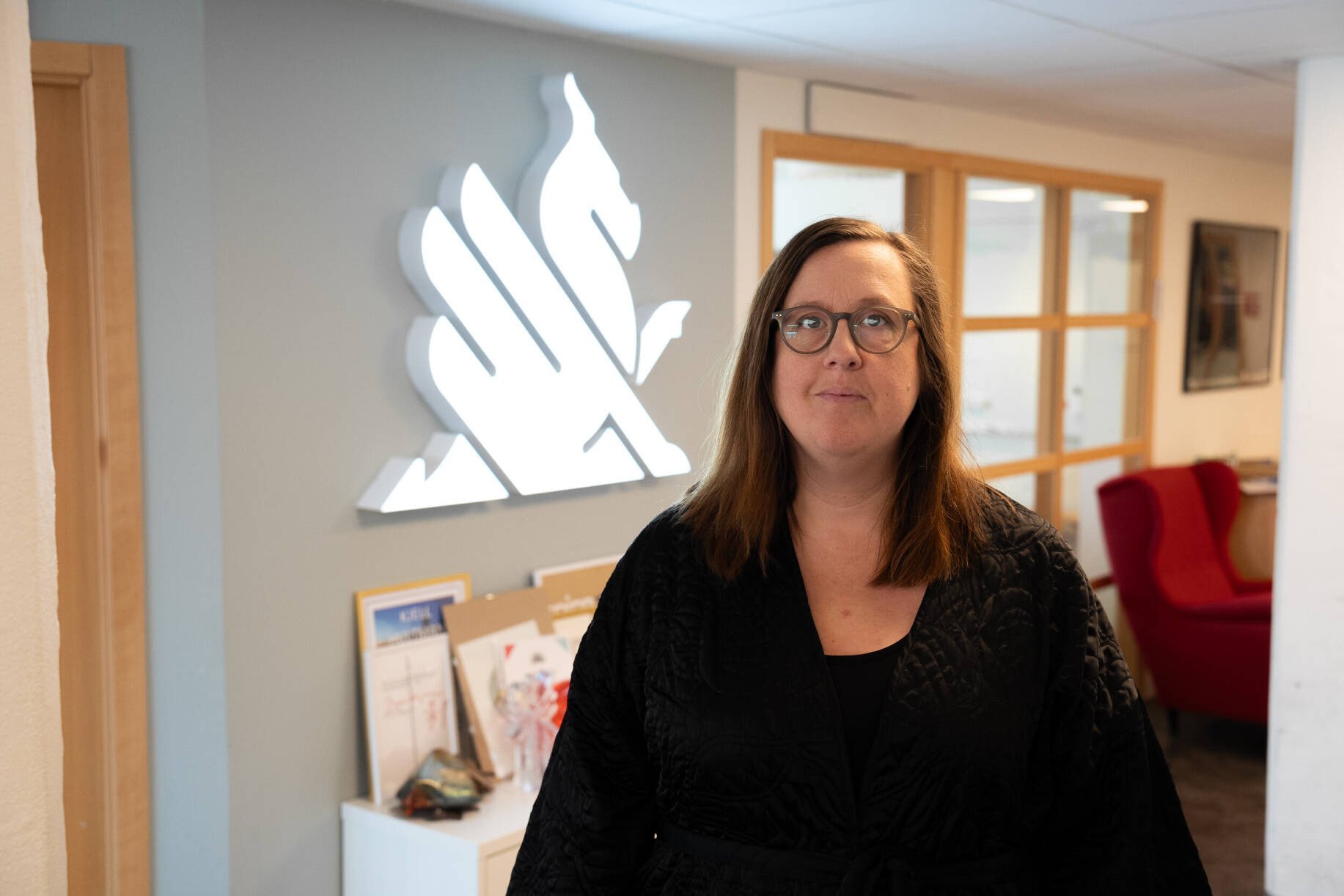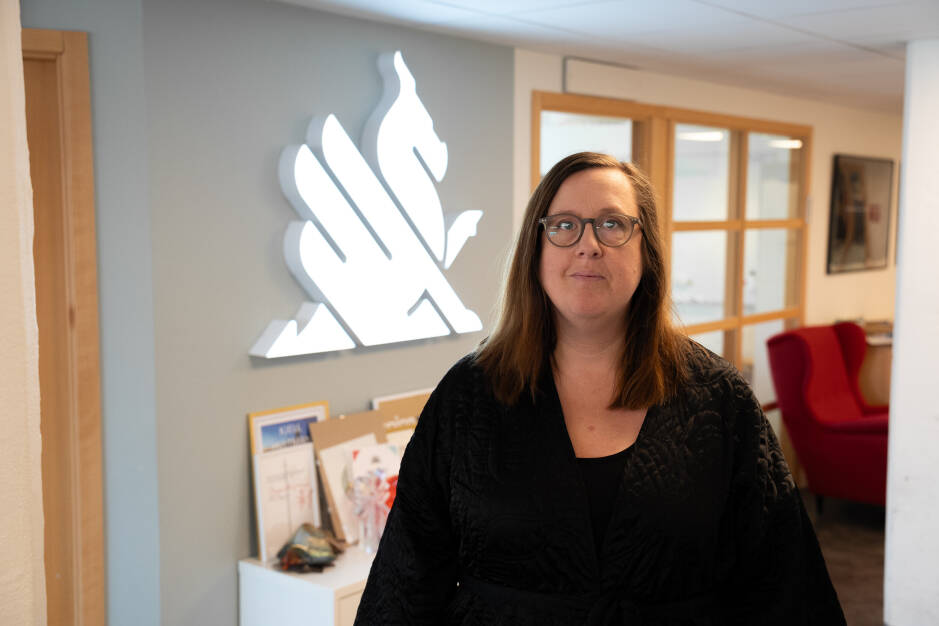The festival office is located above the Draken cinema at Järntorget. This is where Mirja Wester and her colleagues are planning the next edition of Gothenburg's biggest film festival. She shows off the office's small cinema, which is currently being completed.
"There is often talk of a crisis in film, but we don't see it here. Every year we manage to provide a great festival experience," she says.
During high school and for ten years afterwards, Mirja volunteered at the festival's ticket office. It was the most fun week of the year and became a benchmark for her future working life. But her interest in film was not the strongest driving force to get her where she is today.
"It's really the event that is in my DNA, the whole machinery and interaction. It's fun to watch films, but I fell in love with the festival itself," she says.
"Basic course in life"
After high school, Mirja Wester studied a three-year film production programme that included Business Administration A and B. This turned out to be the most enjoyable part of the course, and she felt that everything was falling into place.
"I saw my aptitude and felt that my brain understood it. It's so useful and the subjects are directly applicable, even though you're only 19 years old. Business Administration studies is a basic course in life," she says.
Unique in the film industry
Mirja continued at the School of Business, Economics and Law, where she took independent courses and graduated with a Bachelor's degree in Business Administration. She wrote two theses on leadership in the film industry and her supervisors were very enthusiastic about her work on the intersection of culture and business. Her business studies have made her unique in the film industry.
"I recommend anyone who wants to work with culture to get a degree in economics. Even if you don't want to be a manager, knowledge of organisations and economics is important for success in this industry. It's a very sought-after area of knowledge," she says.
Reluctant leader
When Mirja became CEO in 2016, she had already worked in the festival office for several years as an event producer and head of the Nordic film programme.
"I always thought I wanted to work with culture. But my driving force is not a position, but a context that I enjoy. I'm not artistically inclined at all, which is why I've chosen to work with support functions around artists".
She jokingly describes herself as a reluctant leader, and says that many who become leaders in the cultural sector did not have that ambition.
"I had worked in so many positions at the festival, so it was either become a leader or do something else to develop," says Mirja.
On a leadership course
To continue learning and strengthen her role as a leader, she is now in her third semester of the Executive MBA leadership programme at the School of Business, Economics and Law. It is a two-year part-time programme that can be combined with working life. It is designed for managers with at least three years' experience.
"It is rewarding to bring in your practical experience as a manager and reflect on what you are doing. And it's fun to compare what it's like to work in large companies like SKF with a small organisation like ours, which is driven by non-profit values. It's a clash, but you also realise that you have a lot in common," she says.
The programme has helped her realise that the knowledge she possesses is universal and not just applicable to where she is now. She can make a difference in other places too.
Ability to reflect
Mirja Wester is also a member of the reference group for the School of Business, Economics and Law's Masters in Management. There she supports the programme's integration of culture and the arts by having students watch socially relevant films via the festival's streaming service, Draken Film. They also get to go to the cinema during the festival. The aim is to educate future leaders by working on themselves during their education.
"It is a fun way to give perspective to academic studies and create the ability to reflect. As well as gaining a lot of knowledge, the students also develop as people," she says.
As a teenager, Mirja Wester volunteered at the Gothenburg Film Festival and fell in love with the event. After studying business administration and film, she is now the festival's CEO. She is now taking the next step in her leadership journey through the Executive MBA leadership programme at the School of Business, Economics and Law.
From volunteer to festival director


As a teenager, Mirja Wester volunteered at the Gothenburg Film Festival and fell in love with the event. After studying business administration and film, she is now the festival's CEO. She is now taking the next step in her leadership journey through the Executive MBA leadership programme at the School of Business, Economics and Law.
The festival office is located above the Draken cinema at Järntorget. This is where Mirja Wester and her colleagues are planning the next edition of Gothenburg's biggest film festival. She shows off the office's small cinema, which is currently being completed.
"There is often talk of a crisis in film, but we don't see it here. Every year we manage to provide a great festival experience," she says.
During high school and for ten years afterwards, Mirja volunteered at the festival's ticket office. It was the most fun week of the year and became a benchmark for her future working life. But her interest in film was not the strongest driving force to get her where she is today.
"It's really the event that is in my DNA, the whole machinery and interaction. It's fun to watch films, but I fell in love with the festival itself," she says.
"Basic course in life"
After high school, Mirja Wester studied a three-year film production programme that included Business Administration A and B. This turned out to be the most enjoyable part of the course, and she felt that everything was falling into place.
"I saw my aptitude and felt that my brain understood it. It's so useful and the subjects are directly applicable, even though you're only 19 years old. Business Administration studies is a basic course in life," she says.
Unique in the film industry
Mirja continued at the School of Business, Economics and Law, where she took independent courses and graduated with a Bachelor's degree in Business Administration. She wrote two theses on leadership in the film industry and her supervisors were very enthusiastic about her work on the intersection of culture and business. Her business studies have made her unique in the film industry.
"I recommend anyone who wants to work with culture to get a degree in economics. Even if you don't want to be a manager, knowledge of organisations and economics is important for success in this industry. It's a very sought-after area of knowledge," she says.
Reluctant leader
When Mirja became CEO in 2016, she had already worked in the festival office for several years as an event producer and head of the Nordic film programme.
"I always thought I wanted to work with culture. But my driving force is not a position, but a context that I enjoy. I'm not artistically inclined at all, which is why I've chosen to work with support functions around artists".
She jokingly describes herself as a reluctant leader, and says that many who become leaders in the cultural sector did not have that ambition.
"I had worked in so many positions at the festival, so it was either become a leader or do something else to develop," says Mirja.
On a leadership course
To continue learning and strengthen her role as a leader, she is now in her third semester of the Executive MBA leadership programme at the School of Business, Economics and Law. It is a two-year part-time programme that can be combined with working life. It is designed for managers with at least three years' experience.
"It is rewarding to bring in your practical experience as a manager and reflect on what you are doing. And it's fun to compare what it's like to work in large companies like SKF with a small organisation like ours, which is driven by non-profit values. It's a clash, but you also realise that you have a lot in common," she says.
The programme has helped her realise that the knowledge she possesses is universal and not just applicable to where she is now. She can make a difference in other places too.
Ability to reflect
Mirja Wester is also a member of the reference group for the School of Business, Economics and Law's Masters in Management. There she supports the programme's integration of culture and the arts by having students watch socially relevant films via the festival's streaming service, Draken Film. They also get to go to the cinema during the festival. The aim is to educate future leaders by working on themselves during their education.
"It is a fun way to give perspective to academic studies and create the ability to reflect. As well as gaining a lot of knowledge, the students also develop as people," she says.
From volunteer to festival director